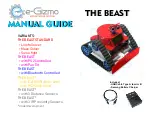
SAFETY
ArcWorld II-200 System Manual
2-4
MOTO
MAN
2.5
Installation Safety
Safe installation is essential for protection of people and equipment. The
following suggestions are intended to supplement, but not replace, existing federal,
local, and state laws and regulations. Additional safety measures for personnel and
equipment may be required depending on system installation, operation, and/or
location. Installation tips are as follows:
•
Be sure that only qualified personnel familiar with national codes, local
codes, and ANSI/RIA R15.06 safety standards are permitted to install the
equipment.
•
Identify the work envelope of each robot with floor markings, signs, and
barriers.
•
Position all controllers outside the robot work envelope.
•
Whenever possible, install safety fences to protect against unauthorized entry
into the work envelope.
•
Eliminate areas where personnel might get trapped between a moving robot
and other equipment (pinch points).
•
Provide sufficient room inside the workcell to permit safe teaching and
maintenance procedures.
2.6
Programming Safety
All operators, programmers, plant and tooling engineers, maintenance personnel,
supervisors, and anyone working near the robot must become familiar with the
operation of this equipment. All personnel involved with the operation of the
equipment must understand potential dangers of operation. Programming tips are
as follows:
•
Any modifications to PART 1 of the controller PLC can cause severe
personal injury or death, as well as damage to the robot! Do not make any
modifications to PART 1. Making any changes without the written
permission of Motoman will
VOID YOUR WARRANTY!
•
Some operations require standard passwords and some require special
passwords. Special passwords are for Motoman use only.
YOUR
WARRANTY WILL BE VOID
if you use these special passwords.
•
Back up all programs and jobs onto a floppy disk whenever program changes
are made. To avoid loss of information, programs, or jobs, a backup must
always be made before any service procedures are done and before any
changes are made to options, accessories, or equipment.
•
The concurrent I/O (Input and Output) function allows the customer to
modify the internal ladder inputs and outputs for maximum robot
performance. Great care must be taken when making these modifications.
Double-check all modifications under every mode of robot operation to
ensure that you have not created hazards or dangerous situations that may
damage the robot or other parts of the system.
•
Improper operation can result in personal injury and/or damage to the
equipment. Only trained personnel familiar with the operation, manuals,
electrical design, and equipment interconnections of this robot should be
permitted to operate the system.










































